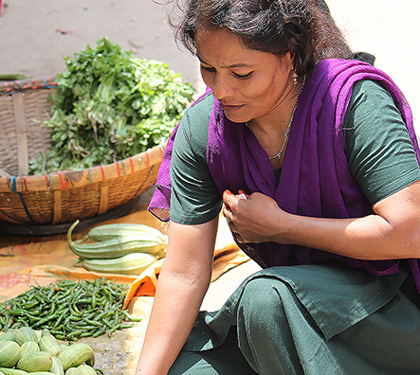Migrant workers helping each other to work safely
Date:
Author: Sharmin Akter
When she first left Bangladesh in 1998, Abeda Begum was only 23. Having heard about the opportunities work overseas promised her, she quickly signed on. “I took out a 120,000 taka loan and took help from a local agent to go to Abu Dhabi,” she recalls.

“After I reached Abu Dhabi, I found no one to receive me. I spent 15 days in the airport, with nothing to eat. I just ate what I could find in rubbish bins – like banana skins that people would throw away.” After finding a Bengali family in the airport, Abeda was able to sell off some of her gold jewelry to buy a ticket back to Bangladesh. Trying to work off her loans, Abeda took on work as a house maid, but retained the hope of earning a living overseas.
In 2012, she connected with NARI (Network for Advocacy, Research and Information), developed with support of UN Women Bangladesh to build the capacity of returning and aspirant migrant workers and promote their empowerment through training, knowledge sharing and collective advocacy.
“Through joining NARI, I have been able to do a wide variety of training,” says Abeda. “I started a small clothing business, and learnt how to be independent. From this, I felt confident to once again apply for jobs overseas, without taking out exorbitant loans, and in 2014 I travelled to Malaysia.”
“That time, I felt a lot more confident because I knew, and followed government rules and regulations that I learnt about from NARI. At the airport in Malaysia I once again had problems. One customs officer demanded 5,000 taka as a bribe. But I told the officer that I would complain to the police of the airport. After that he left me alone.”
While Abeda reached Malaysia safely, her work as a maid there did not go smoothly. “After three months, I decided to come back to Bangladesh. I wasn’t being paid or receiving proper food there.”
Abeda is now back in Bangladesh, and once again part of NARI. As a team leader for the area of Dolpur, she helps other migrant workers navigate the complex government systems and advocates for improvements in policies, programmes and monitoring of services related to migration.
“There is a need for migrant workers to recognize the signs of abuse in their work, and have some recourse for getting out of those situations,” she notes. “When I left Malaysia, I did wish I had someone from the Bangladesh government to help me with the situation, then maybe I would not have had to leave.”
UN Women Bangladesh is continuing to work with returned migrant workers, understand their needs and challenges in employment overseas and life back home. One of the main challenges lies in formulating and implementing standard terms of employment. Having these terms means workers like Abeda will have recourse if their employer does not meet their obligations both before departure, and in their host country. They will also be guaranteed entitlements such as a salary and adequate leave. UN Women Bangladesh is part of a four-year regional project that focuses on the implementation of standard terms of employment for women migrant domestic workers as the key outcome area.
Abeda has re-started her clothing business and once again is looking for more opportunities to improve her life through her work. She has undertaken computer training from NARI, and in addition to her clothing business, also wants to work in a computer shop as a typist.
The involvement of women like Abeda in NARI, supporting other migrant workers, by sharing her experience, while building their own skills, will continue to benefit this group of women, aiming to create better lives for themselves and their families.